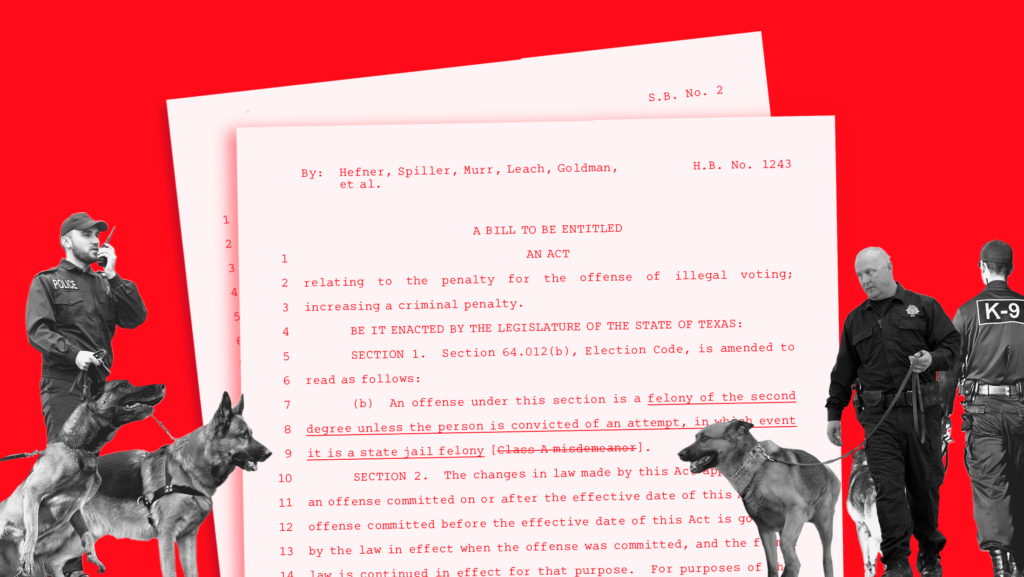The Real Reason Why Texas Republicans Are Criminalizing the Vote

Imagine caring so deeply about participating in our democracy that you wait in line to vote for over six hours just to be arrested over a year later for illegal voting. Or, facing a five-year prison sentence over a provisional ballot that was never counted. This is the story of Hervis Rogers and Crystal Mason in Texas.
With just a few weeks left of the Texas legislative session, lawmakers are doubling down on bills that could make these stories more frequent. House Bill 1243 and Senate Bill 2, bills that would increase the penalty for illegal voting from a Class A misdemeanor to a second degree felony, are currently moving quickly through House and Senate chambers. Just two years ago, in efforts to successfully pass Senate Bill 1, the state’s omnibus voter suppression law, the penalty for illegal voting was lowered to a misdemeanor as opponents to S.B. 1 argued that the punishment did not fit the crime as the bill targeted well-meaning people who made an honest mistake.
Over recent years, Republicans in Texas have led the charge to crackdown on alleged voter fraud while touting unfounded claims of rampant illegal voting. In the two years since lowering the penalty from a felony to a misdemeanor, we have not seen a surge in illegal voting across Texas. There’s absolutely no evidence to suggest that voter fraud is a widespread problem both in Texas and across the country. Regardless, statewide Republican officials are targeting Black and Brown voters under the guise of alleged illegal voting. In the cases of Crystal Mason and Hervis Rogers, they did not know that once released from prison they could not vote. Knowing one’s probation or parole status is not synonymous with knowing complex election code that fails to clearly state when their ability to vote is restored.
In a state that is becoming more left-leaning with rapid population and demographic growth, Republicans are more and more concerned about losing their grip on power.
The Republican Party’s push to make illegal voting a felony is nothing more than a thinly veiled attempt to suppress the votes of people of color. By criminalizing what are often minor or unintentional mistakes in the voting process, these bills work to only intimidate and disenfranchise voters, particularly those from marginalized communities. During the House floor debate, both Reps. Sheryl Cole (D) and Christian Manual (D) testified with statistics and studies proving that allegations of illegal voting effectively and disproportionately target Black and Brown communities.
Despite the attempts of Republican officials to argue that the bills don’t see race nor color, the data shows otherwise. Analysis completed by the American Civil Liberties Union showed that “based on public records, court filings, media reports and assumptions based on common Hispanic surnames, at least 72 percent of all the election fraud cases have been brought against Black and Latino defendants.” It’s worth noting, statewide officials are also only targeting enforcement in diverse counties, such as Harris County, home to Houston, and Tarrant County, a suburb of Dallas.
The data is clear: voter fraud and illegal voting are exceedingly rare. Even with a budget of $2 million, Texas Attorney General Ken Paxton’s (R) “Election Fraud Unit” closed only three cases in 2021 in a state where over 11 million people voted.
H.B. 1243 and S.B. 2 are just the beginning of the Texas far-right, anti-democratic Republican agenda. The Republican bills that seek to criminalize illegal voting are not about ensuring the integrity of the electoral process or preventing voter fraud. They are about maintaining political power and suppressing the voices of those who have been historically marginalized. In a state that is becoming more left-leaning with rapid population and demographic growth, Republicans are more and more concerned about losing their grip on power. Their current attempts to make voting harder with little rationale reveals their efforts to manipulate rules of the game to maintain political control through voter intimidation.
As Pastor Frederick Haynes of Friendship West Baptist Church in Dallas proclaimed at a rally in support of Crystal Mason, “Number one, that our votes matter. And number two, that we will not stand for any type of voter suppression or intimidation.” Not only do these bills create practical barriers to voting, they also send a clear message that some voices are more important than others, and that certain communities are not welcome at the ballot box. A democracy is only as strong as the ability of all its citizens to participate fully and freely in the political process. Democrats in Texas are doing everything in our power to protect that right and ensure that every voice is heard.
Delilah Agho-Otoghile is the executive director of the Texas Future Project and co-founder of Vote Simple. As a contributor to Democracy Docket, Agho-Otoghile writes about the state of voting rights and democracy in her home state of Texas.